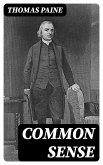This carefully crafted ebook: "COMMON SENSE (Political Classics Series)" is formatted for your eReader with a functional and detailed table of contents Common Sense was published anonymously on January 10, 1776, at the beginning of the American Revolution, and became an immediate sensation. Written in clear and persuasive prose, Thomas Paine marshaled moral and political arguments to encourage common people in the Colonies to fight for egalitarian government. It. Common Sense made public a persuasive and impassioned case for independence, which before the pamphlet had not yet been given serious intellectual consideration. He connected independence with common dissenting Protestant beliefs as a means to present a distinctly American political identity, structuring Common Sense as if it were a sermon. Historian Gordon S. Wood described Common Sense as "the most incendiary and popular pamphlet of the entire revolutionary era". Thomas Paine (1737-1809) was an English-American political activist, philosopher, political theorist, and revolutionary. One of the Founding Fathers of the United States, he authored the two most influential pamphlets at the start of the American Revolution, and he inspired the rebels in 1776 to declare independence from Britain. Paine's ideas reflected Enlightenment-era rhetoric of transnational human rights.
Dieser Download kann aus rechtlichen Gründen nur mit Rechnungsadresse in A, B, BG, CY, CZ, D, DK, EW, E, FIN, F, GR, H, IRL, I, LT, L, LR, M, NL, PL, P, R, S, SLO, SK ausgeliefert werden.









